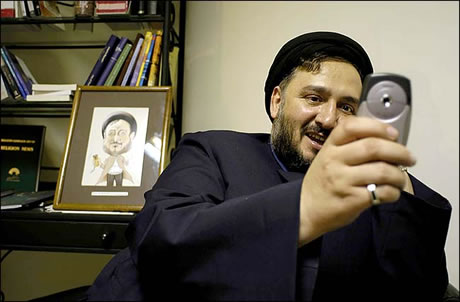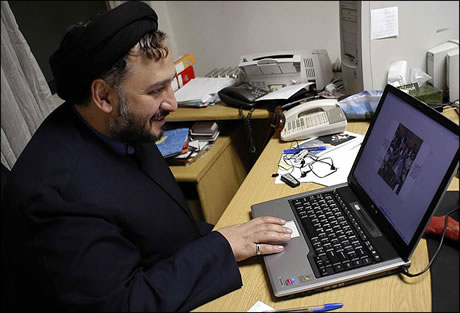|
|
||||||
Mohammad Ali Abtahi, a vice president of Iran until his resignation last fall in protest against the new hard-line Parliament, is that rare reformist who has kept alive the movement's promise for open communications with the public.
For more than a year, Mr. Abtahi, a midranking cleric who has been a close ally and confidant of President Mohammad Khatami, has kept a Web log to share his views and reach out to others who use the Internet.
Mr. Abtahi spends much of his time in his office in the heart of an affluent neighborhood in northern Tehran chatting electronically with young secular men and women who sometimes sarcastically question his sincerity.
Iran's reformists have lost much of the support of Iran's youth, who are impatient for change and who contend that Mr. Khatami and his allies achieved too little in the way of a more open society when they controlled Parliament. The reformists lost control of Parliament last year after hard-line officials disqualified most of their candidates and many disgruntled voters stayed away from the polls.
"We must not trust this cleric," wrote one of the people who have visited the popular Internet chat room Orkut. "He is just one of them and wants to fool us again."
But Mr. Abtahi persists. He has expressed sympathy with the critics' frustration over the slow pace of change.
"It needed a lot of courage to begin the Web log," Mr. Abtahi, now an adviser to Mr. Khatami, said in an interview. "It is hard for younger people to trust a cleric. In the beginning they thought I wanted to preach to them. But now we've become friends."
His blog, webneveshteha.com (the name means Web log writings in Farsi), has become one of the most popular Iranian sites. It has been attacked by hackers several times, apparently in some instances by people who take issue with its content. Many political sites and blogs focusing on Iran both inside the country and outside have links to his site.

"His Web site is politically very important," said Roozbeh Mirebrahimi, a blogger who was imprisoned for two months last year as part of a crackdown on free expression, which Mr. Abtahi has so far escaped. "His inside stories about the president and the cabinet aroused sympathy among people."
Mr. Mirebrahimi added that as an official, Mr. Abtahi "has given legitimacy to Web logs and has proven that Web logs are not tools for the opposition to overthrow the regime."
Mr. Abtahi said that he learned through the Internet about the huge gap between government officials and the younger generation.
"We do not understand each other and cannot have a dialogue," he said. "As government officials, we receive a lot of confidential reports about what goes on in society. But I have felt that I learned a lot more about people and the younger generation by reading their Web logs and receiving about 40 to 50 e-mails every day. This is so different than reading about society in those bulletins from behind our desks."
When he began his Web site, he declared that he was going to be "Mohammad Ali Abtahi only," without standing on ceremony as a government official.
He wrote he was starting his Web log because he had taken amusing photographs of other officials with his new cellphone, equipped with a camera, and he wanted to share them with others.
But he has strayed into deeply serious subjects. At a time when telling the truth can result in a prison term, Mr. Abtahi wrote recently on his Web site about what happened to journalists and bloggers who were jailed for a period in the fall. They were beaten so severely that the nose of one woman was broken, and they were put in solitary confinement for most of their detention, he wrote.
Then he wrote that at a meeting with two of the released detainees, which a hard-line Tehran prosecutor, Saeed Mortazavi, also attended, two journalists had revealed such horrifying details that their account brought tears to the eyes of others in the room.
"We had to give them water so that they could get hold of themselves and continue," wrote Mr. Abtahi, who attended the meeting as Mr. Khatami's representative.

Mr. Mortazavi had warned the released detainees not to talk about their experience, and Mr. Abtahi was summoned to the Special Court of Clergy shortly after he wrote about the meeting.
But after Mr. Abtahi wrote about it, Mr. Khatami and the chief of the Iranian judiciary, Ayatollah Mahmoud Shahroudi, personally promised to follow up on the accusations.
"Without Mr. Abtahi and his Web log we would not have had the courage to reveal what had happened to us," said Mr. Mirebrahimi. "He met with them before we saw them and prepared them for what we were going to tell them. Otherwise they would not have believed us."
Not everyone, even among the reformists, is pleased with Mr. Abtahi's Web log. Ataollah Mohajerani, a reformist who is the former minister of culture and Islamic guidance, scolded Mr. Abtahi and said that what he was doing was "cheap."
|
advertisement@gooya.com |
|
Mr. Abtahi dismissed the comments and pointed out that Mr. Mohajerani had a Web site, too, but that he neither had a camera to take interesting photos nor knew the language of the youth to chat with them.
RELATED SITES:
Webneveshteha.com (English version of Mr. Abtahi's Web log)